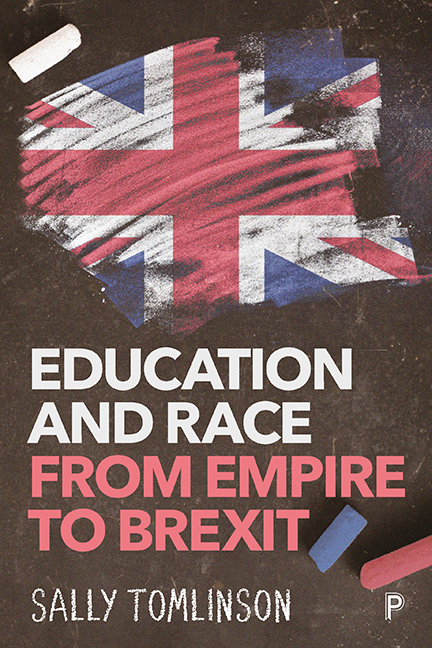Book contents
- Frontmatter
- Contents
- Acknowledgements
- List of abbreviations
- Introduction
- 1 Empire and ethnocentric education
- 2 Internal colonialism and its effects
- 3 Ending empire: Education for ignorance, 1945-1960s
- 4 Post-imperial anxieties and conflicts, 1970-90
- 5 Inequalities, a European Union and education markets, 1990-97
- 6 New Labour: Wars, race and education, 1997-2005
- 7 Not so New Labour: Race and education, 2005-10
- 8 A divided society: Race, class and education, 2010-16
- 9 A dog’s breakfast Brexit, 2016-18
- References
- Index
7 - Not so New Labour: Race and education, 2005-10
Published online by Cambridge University Press: 27 April 2022
- Frontmatter
- Contents
- Acknowledgements
- List of abbreviations
- Introduction
- 1 Empire and ethnocentric education
- 2 Internal colonialism and its effects
- 3 Ending empire: Education for ignorance, 1945-1960s
- 4 Post-imperial anxieties and conflicts, 1970-90
- 5 Inequalities, a European Union and education markets, 1990-97
- 6 New Labour: Wars, race and education, 1997-2005
- 7 Not so New Labour: Race and education, 2005-10
- 8 A divided society: Race, class and education, 2010-16
- 9 A dog’s breakfast Brexit, 2016-18
- References
- Index
Summary
The flood of illiberal measures unleashed by the Blair-Brown regime since 9/11 shows that beneath the accoutrements of civil society the ancien regime is alive and well … a government that has presided over growing inequality and sustained London's role as a happy hunting ground for the rich. (Marquand, 2009: 34)
The polarising effects of terrorism and war accelerated the regression to atavistic notions of Britishness and race. As Blair leaves office, he has the curious distinction of having realigned the level of public racial discourse with his own – by lowering it. (Younge, 2007)
A respected author, journalist and chronicler of British politics wrote in the early 1990s that the quality of government depends on the talent inside the two Houses of Parliament, and especially in the Cabinet (Sampson, 1992). Since then, over the past years, the British public has been presented with a number of seemingly ineffective, quarrelling and self-interested politicians and an increasing number of equally self-interested advisers and rich lobbyists. The dysfunctional relationship between Prime Minister Tony Blair and Gordon Brown, who, full of grievance that Blair did not depart sooner than June 2007, directed attention away from crucial national issues. These included the inequalities of income and wealth that had, by the early 2000s, reached a high point unknown since the 1930s, the looming global financial crisis that left the Queen wondering ‘why did no one notice it coming?’ (Pierce, 2008), the relationships with the EU, and an education system that was fragmented and separatist. Racism and xenophobia were, as Younge noted, fed by Blair's wars and their aftermath. It was ironic that after leaving office in 2007, one of Blair's invitations was to stand by the River Jordan while media mogul Rupert Murdoch had his daughters baptised in the holy waters.
This chapter takes the story up to the defeat of the Labour government in 2010, a legacy of wars in Afghanistan and Iraq overshadowing any earlier positive race policies. There were intensified hostilities to Muslims, asylum-seekers, Eastern Europeans, including Roma, black British citizens and others. The Prevent programme, set up after the London bombings in 2005 by young Muslims, fed suspicion and alienation among Muslims and anger from teachers expected to police young people.
- Type
- Chapter
- Information
- Education and Race from Empire to Brexit , pp. 159 - 174Publisher: Bristol University PressPrint publication year: 2019



